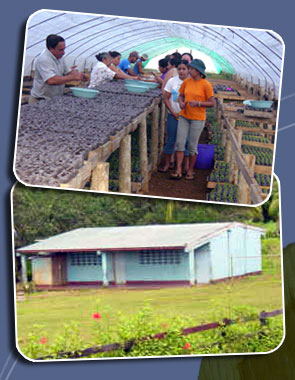![]()
 Being
conscious of the communities’ particular needs and limitations,
Expomaderas and Terra Vitalis have decided to contribute in a direct
and effective way with the towns and villages nearby the company’s
projects; mainly in Banderas, Bella Vista, El Concho, Corozo and
Coquital.
Being
conscious of the communities’ particular needs and limitations,
Expomaderas and Terra Vitalis have decided to contribute in a direct
and effective way with the towns and villages nearby the company’s
projects; mainly in Banderas, Bella Vista, El Concho, Corozo and
Coquital.
With the purpose of realizing this function, Expomaderas and Terra
Vitalis have created a social support fund which will provide necessary
private resources to solve some of the communities’ immediate
needs in four principal areas: health, education, road maintenance
and communitarian recreation sites’ conditioning.
Towns neighboring teak development zones
Houses in the towns in which the projects are developed are small, with zinc roofs, and wooden walls, floors and windows; in few cases the walls are a combination of concrete and wood or only concrete, glass windows and concrete floors. The oldest houses are built on wooden bases to prevent floods and humidity, a situation that almost never happens nowadays.
The population usually lacks aqueducts for potable water, its supply is usually traditionally crafted wells built in each house. These wells are mostly rustic and only a few have concrete walls, extraction pumps and tank storage.
The great majority of these communities have public managed telephony, schools and electricity services, however, it is common to find the use of gas or firewood for cooking.
Primary education is usually given by a single professional who has in his charge the six grades of primary education and one, or two classrooms at most to comply with his duty. To get secondary education, the young ones must travel by their own means to other nearby communities, except for the Concho and Coquital communities which have a high school at their disposition.
Main public roads are stone based, with some short lengths of dirt roads, yet these roads can only be transited during all year by 4x4 vehicles. Public transportation is provided by local neighbors who customize their trucks for passenger transport to the places where bus transport exists.
In some communities, such as Coquital, the roads are mainly dirt and transportation can only be made with 4x4 cars, specially during the rainy season.
Basic health services exist in almost all of the communities, and where they don’t exist, the distance to be traveled is relatively short. This service is provided only certain days of the week, and in the case of requiring a more specialized attention, patients must travel to one of the two regional hospitals located in Los Chiles or Santa Rosa, at a two or three hours drive.
Agricultural crops such as orange, pineapple, yucca, basic grains and reforestation areas are the main work sources for the local workforce, and their main characteristic is their own temporality.